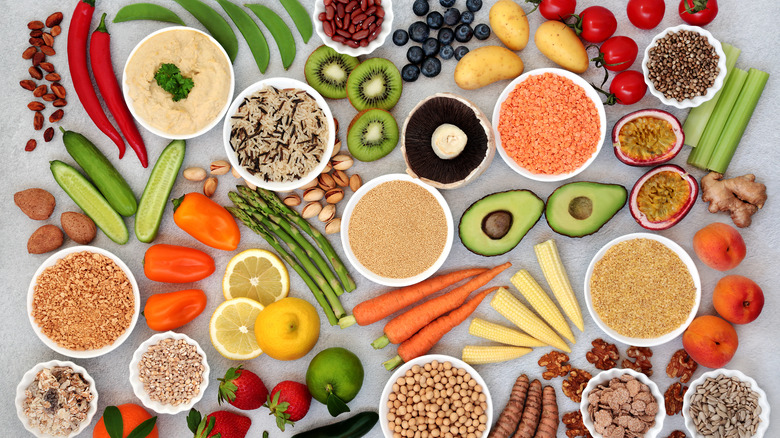Are Plant-Based Diets For Kids Healthy?
While often using the terms vegan and vegetarian interchangeably, a plant-based diet does not actually completely exclude animal-based foods, as per the Harvard Health Blog. A plant-based diet instead focuses on consuming foods that come from plants as much as possible. This includes fruits, vegetables, legumes, beans, whole grains, and seeds.
There are many reasons why people shift to eating a primarily plant-based diet. For starters, the MD Anderson Cancer Center points out that eating mostly plants can reduce our risk for certain diseases, including but not limited to diabetes, heart disease, and stroke. Plants can also minimize inflammation in the body, which is often contributed to diseases like cancer and arthritis. If that wasn't enough, a plant-based diet even strengthens the immune system by supplying important phytochemicals and antioxidants.
Plenty of research has been done over the years to show the link between eating a plant-based diet and benefitting from greater levels of overall health. One 2014 meta-analysis found that people who followed a plant-based diet had lower blood pressure than their fully omnivorous counterparts. Another 2019 study published in the Journal of the American Heart Association found that a plant-based diet can reduce the risk of developing cardiovascular disease by a whopping 16% and lower the chances of dying from it by 31%.
While it's clear that following a plant-based diet comes with many benefits, you may be wondering whether it's appropriate for all stages of life. Mainly, should kids also be partaking in this diet?
A plant-based diet is appropriate for children
Expert in pediatric nutrition, Jennifer Hyland, wrote an article for U.S. News & World Report, in which she explored the question of whether a plant-based diet is a recommended eating pattern for children. She explained that there are many factors to consider when it comes to implementing a plant-based diet in young children, but that overall, she can't help but recommend including an animal protein source within their plant-based diet from time to time.
Hyland points out that while some nutrients are harder to obtain on a strictly plant-based diet, such as iron, calcium, and vitamin D, parents will need to pay attention to the foods their children are eating and supplement when necessary (per U.S. News & World Report). To ensure the best results, Hyland suggests that the entire family follows the same eating pattern and that careful meal planning take place to prevent nutritional deficiencies.
A variety of research backs up Hyland's assertion that plant-based diets are absolutely healthy for kids. A 2013 study found that plant-based diets lowered the incidence of obesity in children. Another 2019 study, carried out in Germany, compared the diets of vegan, vegetarian, and omnivorous children and found that a plant-based diet supported normal growth patterns and nutritional needs in children.
All in all, you can rest assured that your children will benefit from the focus of plant-based foods in their diet as long as you ensure they consume a variety of foods and pay extra attention to the harder-to-get nutrients.

